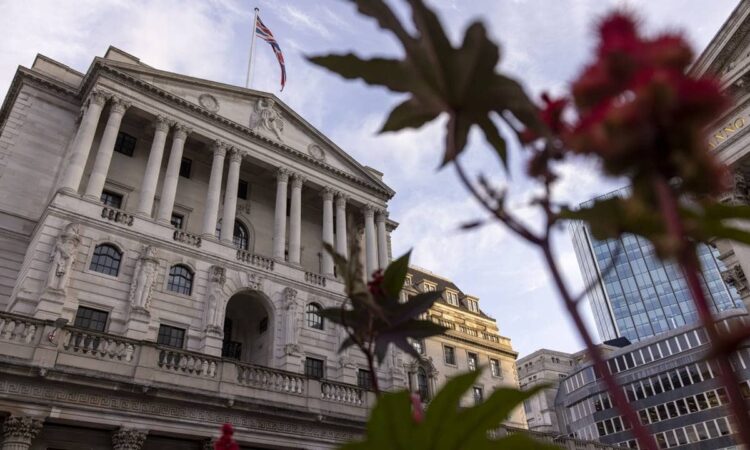
Story continues below Advertisement
Britain’s economy is moving towards the point where the Bank of England can start cutting interest rates, Governor Andrew Bailey said on Thursday as two of his colleagues dropped their calls for a rate hike in the face of easing inflation.
Sterling fell, shares jumped and government bond prices rose after the two policymakers, who previously voted for higher rates, changed position and joined in an 8-1 decision by rate-setters to keep borrowing costs at their 16-year high of 5.25%.
Story continues below Advertisement
It was the first time since September 2021 that none of the Monetary Policy Committee’s (MPC) members had voted for a hike, reflecting how inflation has fallen from a peak of over 11% in 2022 to 3.4% in the 12 months to February.
Bailey said there had been “further encouraging signs that inflation is coming down,” but he also said the BoE needed more certainty that price pressures were fully under control.
“We’re not yet at the point where we can cut interest rates, but things are moving in the right direction.”
Story continues below Advertisement
Asked by broadcasters later whether investors were right to price two or three rate cuts over 2024, Bailey said it was “reasonable for markets to be taking that view” but he stressed he was not endorsing the precise timing or size of cuts.
Most economists polled by Reuters had expected only one MPC member to continue voting for an increase in Bank Rate. But both Jonathan Haskel and Catherine Mann joined the no-change majority. Swati Dhingra again cast the lone vote for a cut.
Investors responded to the announcement by adding to bets on a rate cut as soon as June before paring those positions back down to roughly 70% by 1430 GMT, similar to earlier on Thursday. Markets expect three quarter-point BoE rate cuts over 2024.
Story continues below Advertisement
In another sign of its changing stance, the BoE said monetary policy could remain restrictive even if rates were cut.
“The drop in hawkish dissents shows the direction of travel on the MPC, and signals that the time for a rate cut is drawing nearer,” Allan Monks, an economist with JPMorgan said.
“It tilts the risks around our call for an August cut towards an earlier move.”
The BoE decision follows the U.S. Federal Reserve’s announcement on Wednesday that it remained on track for three interest rate cuts this year, prompting stock market rallies.
The European Central Bank has tried to cool talk about a run of rate cuts for the euro zone.
Earlier on Thursday, the Swiss National Bank cut its main interest rate, becoming the first major central bank to relax monetary policy after the surge in inflation globally.
In Britain on Wednesday, data showed consumer price growth fell to its lowest in almost two-and-a-half years.
But the BoE said indicators of the persistence of inflation remained elevated. It also said Britain’s labour market was still relatively tight although it acknowledged signs that high borrowing costs were weighing on the economy.
“The Bank of England will need to see a lot more moderation in wages and services prices before it starts cutting rates,” Marion Amiot, senior European economist at S&P Global Ratings, said, adding the firm expected a first cut only in August.
INFLATION UNDER 2% SOON
The BoE said inflation – whose surge led to a historic living standards squeeze and remained the highest in the Group of Seven in February – would drop below its 2% target in the second quarter due to the impact of finance minister Jeremy Hunt’s decision this month to freeze fuel duty once again.
Overall, the measures in Hunt’s March 6 budget statement were likely to increase economic output by about 0.25% over the coming years but would push up inflation by less, it said.
The BoE has forecast that inflation will creep up again later this year and most analysts and investors have predicted the BoE will cut rates in the third quarter, probably in August.
The central bank wants to see wage growth slowing further before making its move.
Britain’s minimum wage will rise by nearly 10% next month, and retailers that often pay staff only slightly more have raised salaries ahead of that increase.
Employers overall have offered pay settlements of about 5% since the start of 2024. Average wage growth is about 6%, higher than about 4% in the United States and the euro zone.
As well as employers, mortgage-holders and consumers, the ruling Conservative Party is also keen to see rates come down as it struggles to rein in the opposition Labour Party’s strong lead in opinion polls with an election expected later this year.
Jeremy Hunt took the unusual step of commenting on what Wednesday’s inflation data might mean for the BoE, saying: “As inflation gets closer to its target that opens the door for the Bank of England to consider bringing down interest rates.”
Discover the latest business news, Sensex, and Nifty updates. Obtain Personal Finance insights, tax queries, and expert opinions on Moneycontrol or download the Moneycontrol App to stay updated!





